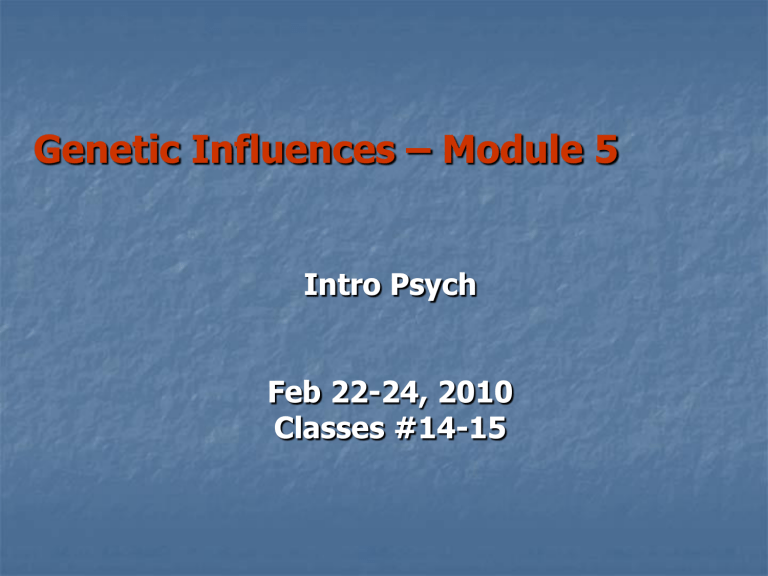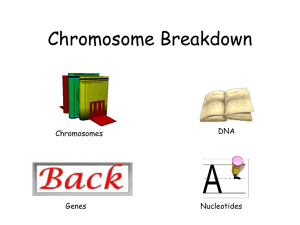Document

Genetic Influences – Module 5
Intro Psych
Feb 22-24, 2010
Classes #14-15
Module 5: Genetic influences
What influences one’s behavior:
Nature or Nurture?
The age-old debate:
Is it genes or is it the environment?
Principle of Genetics
Master plan for your body….
46 chromosomes
23 chromosomes carried in the egg are paired with 23 chromosomes brought to it by the sperm
Each is composed of a molecule called
DNA
DNA is made up of thousands of segments which are called genes
Principle of Genetics
Your sex is determined by the 23 rd pair – the sex chromosomes…
From your mother always an “x”
From your father, you have a 50/50 chance of receiving an x making you a female
From your father, you have a 50/50 chance of receiving an xy making you a male
XX = female
XY = male
Gender Differences…
The differences typically found between the sexes are small compared to the similarities…
But when it comes to casual sex…
See next slides…
“I have been noticing you around campus. I find you very attractive.”
Clark & Hatfield (1989)
In this study, students were approached by another student of the opposite sex, who uttered the above statement…
This was followed by one of three invitations:
“Would you go out tonight?” or
“Would you come over to my apartment?” or
“Would you go to bed with me?”
100
80
60
40
20
0
Go Out
Men were even more likely to say “yes” to the sexual invitation
About half of both sexes said
“yes” to the date
Go to Apt.
Go to Bed
Not a single woman said “yes” to the sexual invitation
Variations in Perceptions and Reactions
Compared to women, men perceive more sexuality in an interaction between a man and a woman
This is true whether they are participants or observers
However, men see interactions involving their sister as platonic
Baumeister, Catanese, and Vohs (2001)
Which gender has the stronger sex drive?
Which desires more frequent sex?
Which thinks more about sex?
Which masturbates more often?
Which initiates more sex?
Which gender makes more sacrifices for sex?
The Burger King Study
Townsend & Levy (1990)
Who would you prefer: a well-dressed unattractive person or a good-looking person in a Burger King outfit???
Burger King study:
First, males were pre-rated into 2 groups:
Handsome versus homely
Each were put into 1 of 3 costumes:
Armani suit with Rolex (high status), white t-shirt
(medium status), or Burger King uniform (low status)
They then did the same for females
Monozygotic
Identical twins
(one-egg)
Dizygotic
Not identical
(fraternal) twins
Resemble one another as much as any brother or sister would
Twin Studies
Nature or Nurture?
Question:
Do identical twins who are adopted by separate families act like one another more than say two adopted children into the same family who have no genetic influences?
Lets look at some case study research to help us determine this…
“The Jim Twins”
Bouchard (1979)
Thomas Bouchard
University of Minnesota twin studies – extraordinary similarities between Jim
Springer and Jim Lewis
Uncanny coincidences?
Any limitations to this study?
The Jim Twins
Tested at the Univ of Minnesota
Intelligence
Personality
Heart Rate
Brain waves
All virtually alike as the same person tested twice
Voice intonations and inflections were so similar that they could not tell each other’s
Twins Oskar Stohr & Jack Yufe
Bouchard (1979)
Part of Bouchard’s twins study…
Oskar Stohl and Jack Yufe were raised in environments with more obvious differences
Did these guys share a flushing the toilet gene?
Oskar raised by Grandmother in Germany as a Catholic and a Nazi
Jack raised by Father in the Caribbean as a Jew
Share traits and habits galore
Love spicy foods
Sweet liquors
Fall asleep in front of the TV
Flush the toilet before using it
Store rubber bands on their wrists
Dip buttered toast in their coffee
Stohr is domineering toward women and yells at his wife as did Yufe before he and his wife separated
And you thought it was because you were incompatible…
Is there a genetic risk of divorce?
McGue and Lykken (1992)
1516 pairs of same-sex twins
722 MZ and 794 DZ
MZ > DZ
McGue & Lykken (1992)
Divorce Rate Study
Study divorce rates among 1,500 same sex, middle-age twin pairs
Fraternal twin who is divorced
Odds of other twin divorcing go up 1.6 times (as compared to the odds of a not-divorced twin)
Identical twin who is divorced
Odds of divorcing go up 5.5 times
Estimation that people’s differing divorce risks are about 50% attributable to GENETIC
FACTORS
Adoption Studies
Adopted children are more similar to biological parents than adoptive parents
Credits:
http://faculty.riohondo.edu/esamaan/geneticshb.ppt#347,52,Culture http://cmweb.pvschools.net/~jkobashi@pvschools.net/FOV2-
0003C700/FOV2-
0003D488/AP%20Psy%20Ch3.ppt?FCItemID=S02351D01&Plugin=Box#34
9,17,Sexuality Why do women’s and men’s sexuality differ?











